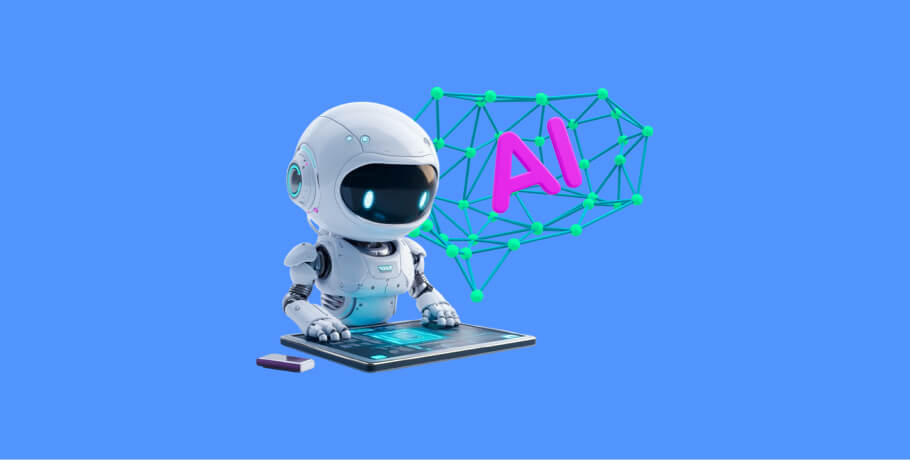Imagine a world where creative tasks, complex data analyses, and personalized interactions are seamlessly handled by intelligent systems.
This isn't a futuristic dream but a current reality where generative AI plays a crucial role. Businesses are harnessing the power of generative AI business use cases to gain a competitive edge, streamline operations, and unlock new opportunities. Dive into this exploration of how generative artificial intelligence is transforming the way we work and innovate across various sectors.
GenAI for business: a challenge or an opportunity?
The rise of generative AI technology presents businesses with both challenges and remarkable opportunities. While initial concerns about data privacy, ethical considerations, and integration costs exist, the potential benefits far outweigh these hurdles. Leveraging generative AI can revolutionize business functions by automating content creation, enhancing customer service, and streamlining operations.
One of the most compelling advantages lies in the generative AI capabilities to produce high-quality content at scale, which can significantly boost marketing efforts. Generative AI models also excel in data analytics, providing businesses with deeper insights and enabling more informed decision-making. These AI tools can analyze vast amounts of data quickly and accurately, uncovering patterns and trends that would be impossible for humans to detect.
Foundation models play a crucial role in these advancements, offering robust and versatile platforms that can be fine-tuned for specific applications. This flexibility allows businesses to tailor AI solutions to their unique needs, driving innovation and efficiency. Embracing generative AI empowers companies to stay ahead of the competition, adapt to market changes swiftly, and offer personalized experiences to their customers.
Ultimately, while challenges exist, the opportunities provided by generative AI are vast and transformative, making it a critical component for future business success.
ADOPT GENAI FOR SOFTWARE ENGINEERING IN 12 WEEKS
Enroll in our EngX GenAI Adoption Program and see your team’s productivity soar by up to 40%.
Use case #1: AI-driven software development
Generative AI in SDLC is revolutionizing software creation, offering unprecedented tools and capabilities to enhance productivity and innovation. Let's explore how the genAI business use cases involving genAI for frontend development and backend development are transforming various aspects of this field and what it means for the future of development.
GenAI for developer productivity
Among the use cases for AI in business, integration of AI for developer productivity has become a game-changer in the realm of development. While not replacing developers by any means, generative AI can assist them by automating repetitive tasks, such as code formatting, error detection, and even code generation. This allows software developers to focus on more complex coding tasks and creative aspects of their projects or project management.
Additionally, AI-driven tools can provide real-time suggestions and improvements, helping developers write cleaner and more efficient code. Generative AI technology can also significantly speed up the development process by offering intelligent project management support. AI can analyze project requirements, track progress, and predict potential bottlenecks, allowing teams to stay on schedule and within budget.
This enhanced productivity not only reduces time-to-market but also improves the overall quality of software products. As a result, companies can deliver better solutions to their clients, maintaining a competitive edge in the industry.
GenAI in software testing & QA
In the realm of software testing and quality assurance, generative AI is proving to be an invaluable asset. By leveraging AI, companies can automate a significant portion of their testing processes, ensuring faster and more accurate results.
Generative AI can create comprehensive test cases and scenarios, simulating a wide range of user interactions and environments. This allows for thorough testing without the need for extensive manual input. Plus, AI can analyze test results in real time, identifying bugs and performance issues more quickly than traditional methods.
Understanding how to use AI in QA in tech companies can lead to more efficient and effective testing strategies. AI-driven QA tools can continuously learn and adapt from past testing data, improving their accuracy and reliability over time. This leads to a significant reduction in the time and resources required for quality assurance, allowing companies to release higher-quality software faster.
By incorporating generative AI into their QA processes, tech companies can ensure their products meet the highest standards of quality and performance.
GenAI in business analysis
Generative AI is also transforming the field of business analysis, making this one of the most appealing business use cases for AI. AI-driven tools can process and analyze vast amounts of data, providing valuable insights that can guide decision-making.
For instance, generative AI can analyze user feedback, market trends, and performance data to identify areas for improvement and innovation. This allows companies to make data-driven decisions that enhance their products and services, ensuring they meet the evolving needs of their customers.
In addition, genAI in software engineering facilitates more accurate and efficient project planning and management. AI can predict project timelines, resource requirements, and potential risks, allowing businesses to plan more effectively. This predictive capability helps companies allocate resources more efficiently, reduce costs, and avoid potential project delays.
By leveraging genAI for business analysis, companies can stay ahead of the curve, continuously improving their products and processes to meet the demands of the competitive market.
Boost your software engineering with genAI in 12 weeks with EPAM EngX
At EPAM EngX, we empower your development team with AI-supported software engineering that drives unparalleled efficiency and innovation and makes the AI use cases for business more accessible.
Our generative AI engineering services promise a remarkable 30-42% productivity gain, leveraging the power of over 10+ AI platforms in our toolkit. With our expertise, you’ll experience a faster time to value by streamlining processes and minimizing bottlenecks. Our advanced generative AI techniques ensure that your software development is not only faster but also of the highest quality, drastically reducing the need for costly rework and revisions.
Imagine transforming your software engineering in just 12 weeks with the industry-leading capabilities of EPAM EngX. By integrating generative AI's capabilities into your workflow, we help you unlock the full potential of your development team.
Our generative tools and data science expertise enable you to tackle complex projects with ease, delivering robust applications that meet market demands. Don’t miss out on the opportunity to revolutionize your development — partner with EPAM EngX today and experience the future of AI-driven engineering.
Use case #2: content creation
Generative AI is revolutionizing how businesses approach content creation, offering innovative solutions to produce high-quality content quickly and efficiently. Let's explore how generative AI use cases in business in this arena are reshaping various aspects of content generation.
Automated article and blog writing
Generative AI's ability to draft articles and blogs with minimal human intervention is game-changing. By analyzing existing content and identifying key themes, AI can produce well-structured, informative pieces that resonate with target audiences.
This technology not only saves time but also ensures consistency and quality across publications. Businesses can maintain an active online presence without the constant need for manual personalized content creation, allowing human writers to focus on more strategic tasks. As a result, companies can engage their audiences, manage marketing campaigns more effectively, and maintain a steady flow of fresh, relevant content.
Social media content generation
In the fast-paced world of social media, keeping up with the demand for social media posts can be challenging. Generative AI simplifies this process by creating engaging and relevant content tailored to each platform. From catchy captions to trending hashtags, AI tools can analyze audience behavior and preferences to craft posts that drive customer engagement.
This not only helps businesses maintain an active social media presence but also ensures that their content remains fresh and engaging. By leveraging AI models for social media, companies can focus more on interacting with their audience and less on the repetitive task of content generation.
Visual content and design
Generative AI is not limited to text; it also excels in generating realistic images and designs – particularly when using generative adversarial networks – making this one of the most intriguing generative AI use cases. Businesses can use generative design to create visually appealing, realistic images, along with graphics, logos, and marketing materials.
AI models can analyze existing visual content and produce new high-quality designs that align with brand aesthetics. This creative content can be used across various platforms, from websites to marketing campaigns, ensuring a cohesive and professional look.
Additionally, generated visuals like product mockups or promotional images can be quickly created, saving time and resources. The ability to produce high-quality visual content on demand significantly enhances a company's marketing capabilities.
Use case #3: data summarization and analytics
Generative AI is revolutionizing the way businesses approach data analysis and summarization. The business use cases for generative AI below are transforming vast amounts of complex information into actionable insights, generative AI tools are enabling companies to make more informed decisions and drive strategic initiatives.
Enhanced data analysis and pattern recognition
Generative AI tools excel at data analytics, providing businesses with the ability to sift through vast datasets quickly and accurately. These tools can identify patterns and trends that might be overlooked by human analysts, offering deeper insights into business operations.
For example, by analyzing historical sales data, generative AI can predict future sales trends, helping businesses optimize their inventory and marketing strategies. Additionally, AI-driven data analysis enables companies to uncover hidden correlations between different data points, leading to more comprehensive and actionable insights.
Plus, the ability to analyze real data or synthetic data ensures that businesses can make data-driven decisions even when actual data is scarce. Generative AI can produce high-quality synthetic datasets that mirror real-world conditions, providing a valuable resource for testing and validation. This capability is particularly useful in scenarios where collecting real-world data is challenging or expensive, ensuring that businesses can continue to innovate and refine their strategies.
Advanced sentiment analysis
Generative AI also enhances sentiment analysis, a crucial tool for understanding customer opinions and feedback. By analyzing social media posts, reviews, and other user-generated content or search data, AI can gauge public sentiment toward a brand, product, or service.
This information is invaluable for marketing teams, enabling them to tailor their campaigns to address customer concerns and capitalize on positive feedback. Further, it can help businesses monitor their online reputation and respond proactively to any emerging issues.
The ability to analyze sensitive data securely is another significant advantage of using generative AI for sentiment analysis. AI models can be trained on anonymized datasets, ensuring that customer privacy is maintained while still extracting valuable insights.
This approach not only builds customer trust but also ensures compliance with data protection regulations. As a result, businesses can leverage it to enhance customer engagement and improve their overall brand perception.
Streamlined data management
Generative AI is transforming data management by automating the organization and summarization of large datasets. AI models can categorize and tag relevant data efficiently, making it easier for businesses to access and utilize critical information.
This automation reduces the time and effort required for manual tasks, allowing employees to focus on more strategic activities. Additionally, generative AI can help maintain data accuracy by identifying and correcting inconsistencies in existing data.
Another key benefit is the use of generative AI in generating synthetic data to augment training datasets. In scenarios where training data is limited, generative AI tools can create synthetic examples that replicate the characteristics of real-world data. This capability is particularly useful for developing and testing new algorithms, ensuring that AI models are robust and reliable.
By streamlining information management and enhancing historical data quality, generative AI empowers businesses to make more informed decisions and drive innovation.
Use case #4: Conversational AI
Conversational AI is transforming how businesses engage with their customers, providing seamless, intelligent interactions that enhance user experience. As a result, it’s one of the most popular business use cases of generative AI. Explore how generative AI is revolutionizing customer service, support, and engagement through advanced conversational capabilities.
Enhancing customer support
Conversational AI tools are revolutionizing customer support by providing immediate, accurate responses to customer inquiries. These AI-driven systems can handle a vast array of questions and issues, significantly reducing wait times and improving customer satisfaction.
By leveraging natural language processing, conversational AI can understand and respond to complex queries in a human-like manner, offering a more personalized and efficient support experience. This not only enhances customer interactions but also frees up human agents to focus on more complex and high-value tasks.
Plus, large language models like GPT-4 enable conversational AI to learn and adapt from each interaction, continually improving its responses. By analyzing user feedback, these AI systems can refine their understanding and provide even more accurate and helpful answers over time. This continuous learning capability ensures that businesses can offer top-notch customer support, staying ahead of the competition and fostering stronger customer relationships.
Driving sales and marketing
Conversational AI is not just limited to customer support; it also plays a crucial role in driving sales and marketing efforts. By analyzing customer behavior and preferences, AI-powered chatbots can recommend products and services that align with individual needs and interests. This personalized approach increases the likelihood of conversions and enhances the overall customer experience.
Additionally, conversational AI can engage with potential customers through AI generated content, such as personalized messages during client interactions and promotional offers, driving engagement and boosting sales. Implementing machine learning algorithms allows these conversational tools to continuously improve their sales techniques, too. They can learn from past interactions to better predict customer needs and tailor their approaches accordingly. This dynamic adaptability makes conversational AI an invaluable asset in any sales and marketing strategy, helping businesses maximize their outreach and conversion rates effectively.
Streamlining internal communications
Conversational AI systems are also transforming internal communications within organizations. AI-driven chatbots can assist employees with routine tasks and queries, providing quick and accurate information on company policies, procedures, and other HR-related matters. This not only improves efficiency but also ensures that employees have easy access to the information they need to perform their jobs effectively. By handling these natural language queries, conversational AI can streamline workflows and reduce the burden on HR and administrative staff.
Additionally, advanced conversational AI can facilitate better project collaboration and data science initiatives by providing real-time insights and updates through conversational AI capabilities. They can analyze project data, track progress, and even suggest improvements, ensuring that teams stay on track and meet their goals. By enhancing internal communications, conversational AI helps create a more cohesive and productive work environment and can increase sales productivity, driving overall organizational success.
Use case #5: Semantic search
Semantic search powered by generative AI is transforming how users find and interact with information, providing more accurate and contextually relevant results. Discover how this cutting-edge technology is enhancing search capabilities across various applications.
Improving information retrieval
Semantic search enhances information retrieval by understanding the context and intent behind search queries. Unlike traditional keyword-based searches, it uses a generative AI model to interpret and process queries in a more human-like manner. This results in more accurate and relevant search outcomes, allowing users to find the information they need quickly and efficiently. By leveraging these advanced models, businesses can significantly improve their search functionalities and provide a superior user experience.
Enhancing customer support systems
Generative AI's ability to process natural language and understand context is revolutionizing customer support systems. With generative AI solutions, customer requests can be resolved more efficiently by providing precise and relevant information based on the context of the query. This not only improves customer satisfaction but also reduces the workload on support staff. Implementing semantic search in customer support platforms ensures that customers receive the most accurate answers to their questions, enhancing the overall support experience.
Streamlining research and development
In research and development, semantic search powered by generative AI foundation models can streamline the process of finding relevant academic papers, patents, and technical documents. These models can understand the nuanced requirements of researchers and provide results that are contextually relevant, saving valuable time and effort. By integrating semantic search into their R&D processes, organizations can accelerate the drug discovery process, drive technological innovation, and more, making it easier to stay ahead in their respective fields.
LEVERAGE THE POWER OF GENAI SAFELY WITH EPAM ENGX
Harness the power of generative AI in your software development processes safely with our expertly designed genAI-assisted engineering framework.
Companies using genAI right now
Expedia
Expedia uses generative models to enhance customer experience by providing personalized travel recommendations and seamless booking assistance. These AI-powered chatbots analyze user preferences and historical travel data to suggest tailored vacation packages, hotels, and activities.
By understanding the context and nuances of customer inquiries, the chatbots can offer relevant options and answer specific questions, ensuring a smooth and efficient booking process. This integration of generative AI not only improves customer satisfaction but also streamlines operations, enabling Expedia to handle a higher volume of inquiries and bookings without compromising on quality or responsiveness.
Amazon
Amazon is enhancing Alexa with generative AI algorithms to make it more conversational and intuitive. By integrating these advanced AI techniques, Alexa can understand and respond to a wider range of natural language input, making interactions more fluid and engaging.
This improvement allows Alexa to provide more accurate and contextually relevant answers, enhancing user satisfaction. Additionally, generative AI enables Alexa to offer personalized recommendations and services, tailoring responses to individual user preferences and behaviors. This evolution in Alexa's capabilities demonstrates Amazon's commitment to leveraging cutting-edge AI to improve user experience and functionality in smart home devices.
Wayfair
Wayfair uses generative AI to help customers redesign their living rooms through its Decorify tool. Once customers upload a photo of their living space, Decorify utilizes the image-generation AI model Stable Diffusion to create new versions of the space in different styles.
This innovative use of generative models allows customers to visualize various design options and see how Wayfair products can fit into their homes. By offering personalized and realistic design suggestions, Wayfair enhances the shopping experience, making it easier for customers to make informed decisions and find products that match their aesthetic preferences.
Alibaba
Alibaba employs generative AI applications to create compelling and accurate product descriptions for its vast array of listings. These AI-driven descriptions are generated by analyzing product features, customer reviews, and market trends, ensuring that each description is detailed and relevant. This approach not only saves time and resources but also ensures consistency and quality across all product descriptions.
By leveraging AI solutions, Alibaba can efficiently manage its extensive inventory, providing customers with clear and informative descriptions that enhance their shopping experience and aid in making well-informed purchasing decisions.
Conclusion
Generative AI use cases are rapidly transforming various business areas and operations, offering innovative solutions that enhance efficiency and drive growth. From content creation and data analytics to application development and semantic search, the potential applications of this technology are vast and impactful.
Companies like Expedia, Amazon, Wayfair, and Alibaba are already harnessing the power of generative AI models to improve customer experiences and streamline operations. Embracing generative AI applications can provide a competitive edge, enabling businesses to adapt quickly to market changes and meet evolving customer needs. Now is the time to explore and invest in generative AI to stay ahead in the ever-evolving digital landscape.
FAQ

Expert digital communicator and editor providing insights and research-based guides for technology buyers globally.
Expert digital communicator and editor providing insights and research-based guides for technology buyers globally.
Explore our Editorial Policy to learn more about our standards for content creation.
read more














